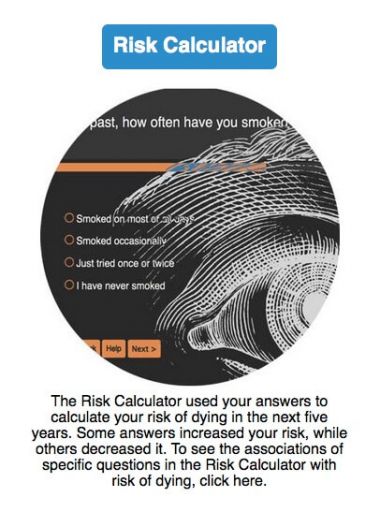Ubble trouble: Why we don't need to know when we'll die

I'm a little coy about my age, except among friends, mainly because I don't actually believe it: in my head I'm about 25. But I was rather pleased to find out today that I am eight years younger than my birth certificate suggests, and that I have only a 1.4 per cent chance of dying in the next five years.
Yes: like most of the rest of the population, I've taken the Ubble Risk Calculator questionnaire.
It stands for UK Longevity Explorer, and it's a serious project aimed at using information from the UK Biobank, which gathered knowledge about death and disease in a huge project from 2006-2010, to predict mortality. It was discovered that things like how fast a person walked, whether they smoked and how healthy they actually felt were pretty good indicators of how likely they were to see out five years. (It only works for people aged 40-70 because that's where the data comes from.)
It comes with a caveat, of course: "This risk calculator gives an estimate of how many people with similar answers will live and die within the next five years. However, it does not predict the future for any one individual; it cannot identify who will live and who will die."
Most of those who clicked on the test, though, probably did so because they wondered whether it could.
Most of us, for most of our lives, have no idea when we will die. It's only when we are diagnosed with a terminal illness that we have some sort of timetable. Most of us manage to face it in the end, with courage, regret or acceptance.
But the not knowing is a great gift. In the first published story of the science fiction master Robert Heinlein, Lifeline (1939) – spoiler alert! – Professor Pinero invents a machine capable of predicting exactly how long someone will live. It plays havoc with the life insurance industry, and powerful interests conspire to have him murdered and his machine destroyed. The story closes with his partners agonising over whether to open the envelopes containing their own predictions. They elect to burn them instead.
The gift of not knowing allows us hope. As far as we know, there will be a tomorrow which may be better than today, and will at least probably be different. Even in our old age, there are possibilities before us. If we knew for certain when we would die, it's hard to believe the knowledge wouldn't overshadow every moment of every day.
But knowing that we don't know is also a responsibility. In Psalm 39:4, the psalmist says: "Show me, O Lord, my life's end, and the number of my days; let me know how fleeting is my life." He is asking God to remind him of the brevity of life: "Man is a mere phantom as he goes to and fro: he bustles about, but only in vain; he heaps up wealth, not knowing who will get it" (v6); it is very modern.
The response to knowing that we are to die shouldn't be fear, the psalm sees to say, but a resolve to serve God and put down roots in eternity.
And of course there's still that question of 'when'. Ubble can't tell us that (though it might tell us to stop smoking or walk a little faster). But Jesus told the story of the 10 bridesmaids, five of them ready for the bridegroom and five emphatically not (Matthew 25:1-13): the moral is, "Therefore keep watch, because you do not know the day or the hour."
So the challenge is to orientate our lives not towards a distant goal – a career, a qualification, an adventure – but towards a present relationship which is constantly renewed. Whether our lives are short or long, readiness is all.
In developed societies we live so much longer nowadays that we're inclined to put off thoughts of mortality. Death in old age is the norm. We should think about it more than we do, though: living uncertainly has a lot to teach us. Perhaps Ubble's questionnaire will encourage a few questions.
Follow @RevMarkWoods on Twitter.











